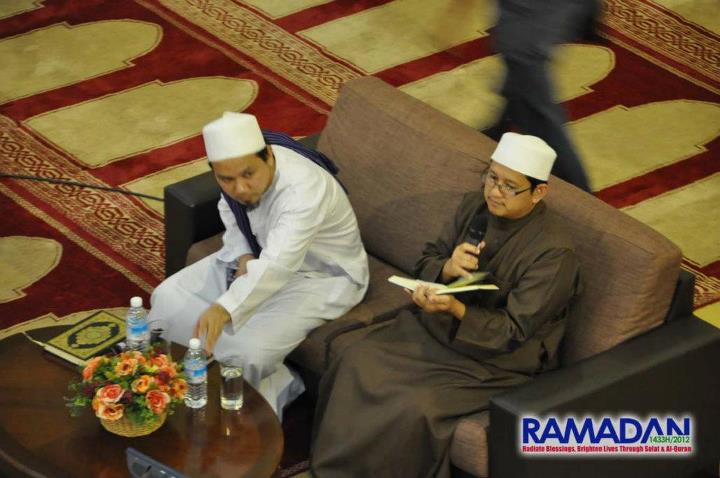The Mufti of Singapore, Dr Mohamed Fatris Bakaram, accompanied by Ustaz Khairun Nizam, began his talk following the completion of the tarawih and witir prayers by reciting from Surah Fatir, the 35th surah of the Qur’an, reading verses 27 to 33.
Do you not see that Allah sends down rain from the sky, and We produce thereby fruits of varying colors? And in the mountains are tracts, white and red of varying shades and [some] extremely black.
And among people and moving creatures and grazing livestock are various colors similarly. Only those fear Allah , from among His servants, who have knowledge. Indeed, Allah is Exalted in Might and Forgiving.
Surah Fatir, verse 27-28
Proceeding to delve deeper into the meanings of the verses, Dr Fatris stated that the ayat, or signs, of Allah were not just in the Qur’an but also in the world around us. Reading verses 27 and 28, Dr Fatris said that the earth, the fruits, as well as people and animals were found in many varieties and many colours, and that differences were to be found even between twins. Dr Fatris also pointed out that there were cultural differences between Chinese, Malays, Africans, Europeans, and those of other races. Character, morals and personal preferences were also sources of differences. However, in the sight of Allah the only differences between people were those of taqwa.
Indeed, those who recite the Book of Allah and establish prayer and spend [in His cause] out of what We have provided them, secretly and publicly, [can] expect a profit that will never perish
Surah Fatir, verse 29
Speaking on verse 29 of Surah Fatir, Dr Fatris clarified that though some people were of the opinion that giving should only be done secretly to avoid riya’, or arrogance, there was no problem with giving openly, as long as our charity was given with ikhlas. He related that Sayyidina Umar had publicly given half his wealth in charity, only to be bested by Sayyidina Abu Bakr As-Siddiq, who gave all his wealth.

When asked by Rasulallah (SAWS) what he had left his family, Abu Bakr famously replied “Allah and His messenger”. Had public giving been forbidden, Dr Fatris said, surely the Prophet (SAWS) would have chastised both Sayyidina Abu Bakr and Sayyidina Umar for this incident. Thus, Dr Fatris emphasised that we should never, even in our hearts, look down on people who give in charity.
Dr Fatris also noted that in that same verse there was a difference, that while not noticeable in translation, was obvious in the Arabic. “Recite the Book of Allah” was in the present tense, while “establish prayer” and “spend [in His Cause]” were in the past tense. This, the Mufti explained, was because while prayer and charity were acts that ended upon their completion, the reading of the Qur’an is an ongoing process. Beyond mere tilawah, he stated, it was important for us to understand the meanings of the verses.
However, Dr Fatris stated, that there were many university professors of Islam who were not Muslims and yet understood the meanings of the verses of the Qur’an and even memorised it. Thus, beyond understanding the verses, it was important to act upon the teachings contained within. It is important for us to follow in the footsteps of the Prophet (SAWS), whose character, as mentioned by Sayyidatina Aisha, was the Qur’an.
Then we caused to inherit the Book those We have chosen of Our servants; and among them is he who wrongs himself, and among them is he who is moderate, and among them is he who is foremost in good deeds by permission of Allah . That [inheritance] is what is the great bounty.
Surah Fatir, verse 33
Elaborating on verse 32, we were chosen by Allah to inherit the Qur’an and be from among the ummah of the Prophet (SAWS). As stated in the verse, among those who received the Qur’an were those who rejected it, those who were muqtasad (moderate) and those who raced towards goodness, who were the best of them.
Explaining the verse further, Dr Fatris that all these groups were still Muslim, and thus we should not hate or judge other Muslims. People too easily condemn others, when we are unaware of our own status or that of others. Not wishing to take up too much of the worshippers’ time, Dr Fatris ended his talk there, bringing the first half of the evening to a close.
Qiyammulail with the Mufti

The second half of the evening saw almost the entire prayer hall of Masjid Sultan occupied by worshippers. While many were catching up on sleep prior to the qiyammulail prayers, just as many were occupied with acts of ibadah, performing their sunnah prayers, reading the Qur’an or doing dhikr. Given that it was the start of the last ten nights of Ramadan, and the next day was public holiday, many had taken the opportunity to spend their night in prayer with the Mufti in this holy month.
At 3.45am, Dr Fatris came out to lead the qiyammulail prayers as imam. 8 rakaats of prayer were performed in cycles of 2 rakaats each, and Dr Fatris explained to the jamaah that they could make the intention to pray the prayers as either tahajud or hajat prayers. Reading the entirety of Surah Ar-Rum across the eight rakaats, Dr Fatris was at times moved to tears in the middle of the prayers. Following the prayers, Dr Fatris recited a lengthy du’a, asking for Allah’s forgiveness and mercy for the jamaah and all Muslims.
May Allah grant all those present, and all those spending their nights in prayer in these last nights of Ramadan, the gift of Laylatul Qadr, the night better than a thousand months.








